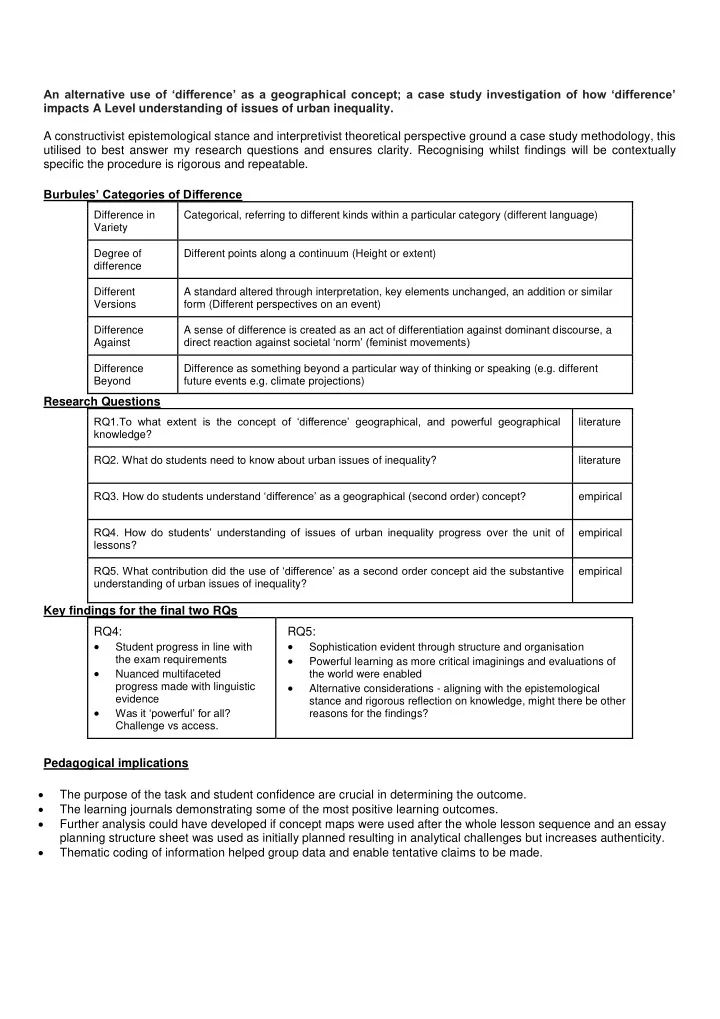

An alternative use of ‘difference’ as a geographical concept; a case study investigation of how ‘difference’ impacts A Level understanding of issues of urban inequality. A constructivist epistemological stance and interpretivist theoretical perspective ground a case study methodology, this utilised to best answer my research questions and ensures clarity. Recognising whilst findings will be contextually specific the procedure is rigorous and repeatable. Burbules’ Categories of Difference Difference in Categorical, referring to different kinds within a particular category (different language) Variety Degree of Different points along a continuum (Height or extent) difference Different A standard altered through interpretation, key elements unchanged, an addition or similar Versions form (Different perspectives on an event) Difference A sense of difference is created as an act of differentiation against dominant discourse, a direct reaction against societal ‘norm’ (feminist movements) Against Difference Difference as something beyond a particular way of thinking or speaking (e.g. different Beyond future events e.g. climate projections) Research Questions RQ1.To what extent is the concept of ‘difference’ geographical, and powerful geographical literature knowledge? RQ2. What do students need to know about urban issues of inequality? literature RQ3. How do students understand ‘difference’ as a geographical (second order) concept? empirical RQ4. How do students’ understanding of issues of urban inequality progress over the unit of empirical lessons? RQ5. What contribution did the use of ‘difference’ as a second order concept aid the substantive empirical understanding of urban issues of inequality? Key findings for the final two RQs RQ4: RQ5: • • Student progress in line with Sophistication evident through structure and organisation • the exam requirements Powerful learning as more critical imaginings and evaluations of • Nuanced multifaceted the world were enabled • progress made with linguistic Alternative considerations - aligning with the epistemological evidence stance and rigorous reflection on knowledge, might there be other • Was it ‘powerful’ for all? reasons for the findings? Challenge vs access. Pedagogical implications • The purpose of the task and student confidence are crucial in determining the outcome. • The learning journals demonstrating some of the most positive learning outcomes. • Further analysis could have developed if concept maps were used after the whole lesson sequence and an essay planning structure sheet was used as initially planned resulting in analytical challenges but increases authenticity. • Thematic coding of information helped group data and enable tentative claims to be made.
Recommendations for further research • Dynamic and contested nature of geographical knowledge presents opportunity to engage with wider academic literature for similar research by teachers, and in curriculum design. • Research into the importance of each category of difference on specific geographical content. • Research into introducing the research with lower age groups and to make it more generally accessible for teachers. • Emotive aspect of geographical content challenges teaching about differences. • Challenge of evidencing student learning - theoretically and conceptually complex - themes and codes. In this presentation I will briefly outline the research project before presenting my empirical findings I then discuss the overall conclusions, pedagogical implications and finally suggesting some considerations for further research. Initial problem The thinking behind the thesis came with the realisation there was a need for A Level students to consider geographical issues with more complexity. Their evaluations at GCSE were simplistic yes/no for/against and this style and structure was limiting at A Level. I explore in this thesis an alternative view of the concept of difference and apply it in a geographical sense in an attempt to enable students to write more sophisticated and nuanced evaluations of issues of urban inequality. This application of the theory of difference examines not only that are things different but instead focuses on the different ways things are different and in so doing develops a better understanding of the phenomenon being examined. Presented on the handout for ease I utilised 5 of the 8 categories of difference as identified by the work of educational philosopher Nicholas Burbules in an attempt to address the problem of simplistic yes/no for/against style geographical evaluations. Teaching in West London at the time with a socially diverse Year 12 class in a large, state comprehensive this is relevant as the context provides important and valuable insight into student learning. Qualitative analysis of semi-structured interviews (both individual and paired) raised some interesting pedagogical insights, especially when triangulated with thematic coding of concept maps. I introduced student learning journals at the start of the year, another significant method in highlighting initial student confusions in the six lesson enquiry, before demonstrating at times impressive application of the concept of difference and the geographical content of issues of urban inequalities. The final assessment, I administered a complicated exam style essay provided opportunity for the students to demonstrate sophisticated evaluation. The research provides a small but intriguing contribution to the discourse surrounding powerful geographical knowledge, and tentatively offers an optimistic outlook that geography could potentially present in exploring alternative and powerful interpretations of the world. Geography as a discipline is difficult to define, geographical knowledge is dynamic and contested, it is as complex as people, the natural world and the interactions between the two. Therefore I reveal the opportunity to explore alternative forms of geographical information and add to the discourse surrounding the discipline. (Massey/Taylor) Difference has a significant role in geography through marginalised discourse. Therefore the application of the concepts of difference aligns with geographical content of issues of urban inequality and is powerful for the students in a number of ways. It is more academically rigorous as it enables critical questions of the world, society and policy to be asked; it is also socially enabling as the knowledge gained enables students to pass exams, but also informs students to enact positive change and make better decisions about the world around them (Young).
Recommend
More recommend